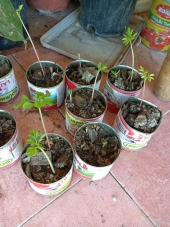I am a chef, and collect
compost from three of my restaurants. One is European fine dining, one is Japanese, one is a high end pizza shop.
I come home most nights with three 5 gallon buckets, filled with objects that span the globe. There is used kombu and katsuobushi from making dashi, and burned pizzas, stale bread, steamed rice, demi glace, parts of twenty varieties of plant life, lacto-fermented pickles, wood chunks and ashes from oak in one bucket and mesquite or cherry in another.
I raise chickens, Pekin ducks, goats, sheep, a dog and one ornery donkey. First stop, I pour the most vegetous of the buckets on the ground one square in front of the poultry tractors, and pull it over.
It's like kids at a pinata party. They dive on it and squabble for their favorite goodies: their favorite thing in all the world is watermelon, very soft lettuce a distant second. Their enthusiasm trickles it way down to starches (bread is a decent pick, but rice is barely worth stooping down for).
I move the tractors every morning, so that the layer of poop and detritus gets pounded with South Texas' blasting sun. When I pull them forward one square, everybody else who does not live in a cage (laying hens, and everybody else) comes to see if anything interests them. Thicker leaves go over with the sheep, goats especially like burnt bread. Chickens love just about anything pasty, it seems. The dog looks for stuff soaked in demiglace, bits of butter, a stray pork bone here and there.
I know all this sounds kind of gross, but they love it--it's the noisiest, flappiest part of everyone's day. (I understand the cross contamination issue this raises, but starting with ducks, so far I have not had any interspecies infections from this practice.)
After one day in the sun, anything left on yesterday's square has dried up like a cracker, positively roasted in UV rays. Since vegetable matter is mostly water, by the second day all that is left is paper-thin leaves, corn husk, a slight darkening of the sand.
Animals poop and pee. I move all water sources, all tractors, all feeding locations. The poop from the birds is nitrogen dense but thins quickly on the sand--dries to a cracker, and powders in days. The poop from the ruminants is about half used stuff, and scattered in a perfect spray of pellets, just as if you'd shook them out with a can. Donkey poop is almost entirely plant fiber, making little oases for the beetles and larvae the chickens enjoy (subsidizing the chickens while spreading piles of ground grass mulch in the process).
Water likewise radiates from a water source. Everybody drinks from a point, and they pee where they feel like it. While they all pee in different places, each species has a different hangout radius and behavior, and you can learn their behavior, how far and how soon you should move everything over to get them hanging over a new space, and roughly control where this moisture and urea end up.
I don't know what you'd call that, composting by entrails?
But the nutrients, minerals, calories and moisture from my buckets are transformed and transferred to the soil and the plants in what seems to be a pretty complete and efficient way: every drop or crumb pays a minimum of two eaters on its way to the soil, pays me in eggs and chicken and goat and lamb and guarding, then pays us again every time it rains.
(And I didn't lift a shovel.)

 10
10




 2
2




 2
2




 2
2





 1
1




 8
8




 2
2




 4
4




 4
4











